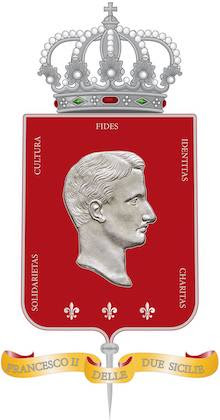By Niccolò Graffio
Since I began writing for this blog, my articles have dealt mainly with famous indigenous inhabitants of Southern Italy/Sicily. It behooves me to mention, though, since the destruction of the Kingdom of the Two Sicilies in 1861, the majority of the members of our ethnos were born outside the borders of the modern state of Italy in what I like to term “the Sicilian Diaspora”. I happen to be one of them.
The loss of our national identity (through conquest), plus the dispersal of so many of our people to the far corners of the world, have acted in many if not most cases to erase our ethnic identity as we become submerged in a greater “Italian” identity (though as second-class Italians, since we are, after all, “Southerners”). Example: if one just takes a cursory look at the names of famous “Italians” in American history books, one gets the feeling nothing great was ever done by a Southerner. It was all done by “Northerners” such as Columbus, Vespucci, Marconi, etc. If one believes Hollywood, the only “contribution” made to Western societies by Southern Italians is in the formation of criminal organizations (thanks to films like “The Godfather Trilogy” and TV shows like “The Sopranos”).
We must understand, though, there have arisen from our ranks those who have made real and lasting contributions. If we are to survive as a distinct ethnic group, it’s important to call attention to the accomplishments of these folks as well in order to present a clearer picture to everyone of how we as a people have found a place for ourselves in this world, even if we no longer have a country to call our own.
When writing articles such as these, one is tempted to write exclusively about great scientists, musicians, artists, philosophers, etc. Civilization, however, encompasses much more. The ancient Greeks understood that sports are an integral part of a civilized society. They teach teamwork, camaraderie, positive competition and a respect for rules. They also provide a healthy outlet for aggressive tendencies which occur naturally in humans. No roster of “greats” would be complete without including great sportsmen. Thus, this article will deal with an iconic sports figure in American history who just happened to be a “Southerner.”
Giuseppe Paolo “Joe” DiMaggio was born on November 25, 1914 in the city of Martinez, California. His parents, Giuseppe and Rosalia, were immigrants from the island of Sicily. Joe was the eighth of nine children (five boys, four girls). When he was a year old, the family relocated to San Francisco, California.
The elder DiMaggio was a fisherman, who came from a long line of fishermen. He had hoped his sons would follow him in the family trade. His two oldest sons (Tom and Michael) did, but Joe, along with his brothers Vince and Dominic, would be bitten by baseball fever.
 As Joe would later recall, he hated handling fish and would do anything to get out of it. For this his father called him “lazy” and “good for nothing”. Nevertheless, Joe was determined to make a career for himself in baseball. He joined a semi-pro team. It was his brother Vince, however, who introduced Joe to the world of professional baseball. Vince, who played for the San Francisco Seals (Pacific Coast League), convinced his manager into letting his younger brother fill in at shortstop. Joe DiMaggio would make his professional debut on October 1st, 1932. The world of baseball would get a taste of future greatness when, during the following year, Joe would get at least one hit for 61 consecutive games!
As Joe would later recall, he hated handling fish and would do anything to get out of it. For this his father called him “lazy” and “good for nothing”. Nevertheless, Joe was determined to make a career for himself in baseball. He joined a semi-pro team. It was his brother Vince, however, who introduced Joe to the world of professional baseball. Vince, who played for the San Francisco Seals (Pacific Coast League), convinced his manager into letting his younger brother fill in at shortstop. Joe DiMaggio would make his professional debut on October 1st, 1932. The world of baseball would get a taste of future greatness when, during the following year, Joe would get at least one hit for 61 consecutive games!
Needless to say, it would only be a matter of time before such a player would attract the attention of owners of Major League Baseball teams. Touted by sportswriters as Babe Ruth, Ty Cobb and “Shoeless Joe” Jackson all rolled up into one (it was actually Ty Cobb who was instrumental in negotiating DiMaggio’s rookie contract with the NY Yankees), Joe would make his major league debut on May 3rd, 1936, batting ahead of “Iron Horse” Lou Gehrig. It was reported that 25,000 cheering, flag-waving Italian residents showed up to welcome him to the team.
The Yankees had not won the World Series since 1932. With Joe DiMaggio’s power added to the team roster, however, they were able to win the next four (’36-’39). He remains the only athlete in North American pro sports history to be on four World Championship teams in his first four full seasons. In total, he led the Yankees to nine titles in 13 seasons. His nickname, “Yankee Clipper”, was given to him by broadcaster Arch McDonald for the gracefulness he displayed on the field.
Joe’s good fortune in baseball, sadly, did not transfer over to women. His first marriage, to actress Dorothy Arnold, was by all accounts a disaster. He was a high school dropout whose life revolved around the game of baseball. She, on the other hand, was an ambitious social climber who loved the Manhattan night life. They married on November 19th, 1939, and produced one son, Joseph Paul DiMaggio III, who was born on October 23rd, 1941. After several years of less-than-marital-bliss, Dorothy was granted a divorce on May 12th, 1944. She retained custody of their son.
As the United States geared itself up for war in 1941 (after just pulling itself out of the Great Depression), Joe would provide the country a brief, if very memorable, respite from its troubles. Between May 15-July 16, 1941 he would hit at least once in 56 consecutive games; a staggering feat unmatched before or since in Major League Baseball history! The timing couldn’t have been better, and to say he was lionized for it would be an understatement!
World War 2 would be another dark chapter in Joe’s life. Though he enlisted in the U.S. Army Air Forces on February 17th, 1943, eventually rising to the rank of sergeant (as a Phys. Ed. Instructor), sadly his parents were among the thousands of Italian, German and Japanese immigrants classified as “enemy aliens” by the U.S. government after the Japanese bombing of Pearl Harbor on December 7th, 1941. Giuseppe and Rosalia DiMaggio had to carry photo ID booklets on their persons at all times and were prohibited from traveling outside a five-mile radius from their homes without a permit. In the final outrage, Giuseppe was prohibited from going near the San Francisco Bay area and his boat was seized, effectively depriving him of his livelihood. In spite of this (or maybe because of it), Rosalia became an American citizen in 1944; Giuseppe in 1945. Joe rejoined the Yankees in the spring of 1946.
It has been said every man has one great love in his life. Joe DiMaggio had two: baseball and Norma Jeane Mortenson (aka Marilyn Monroe). Their stars first crossed in 1952 (a year after he retired from baseball). By her own account, when it was first proposed the two should meet she was less than receptive to the idea. She may have been wise in that regard. He was, after all, a middle-aged, uneducated, “old school”- type who was looking for a wife to settle down with and hopefully have children. She, on the other hand, was a young, uneducated, highly neurotic actress whose star was just starting to take off and the last thing she wanted was to be tied down by anyone!
In spite of her initial reservations, she agreed to meet with him and the two had an arranged dinner date. A romance followed that culminated in the two getting married on January 14th, 1954. This marriage would prove to be even more disastrous than Joe’s first! His desire for domestic tranquility inevitably clashed with her desire for movie stardom. Amid public accusations of “mental cruelty” (and privately some would say: physical abuse) she filed for divorce just 274 days after they married. Despite media “leaks” linking him with other starlets, Joe always denied involvement with other women, and he never remarried.
Joe would re-enter Marilyn’s life again years later as her marriage to playwright Arthur Miller disintegrated (along with her emotional stability). He secured her release from Payne Whitney Psychiatric Clinic on February 10th, 1961. They remained close until her death on August 5th, 1962. Though they were obviously not “marriage material”, it should be duly noted that of her three husbands, and all the people who knew her (or claimed to know her), he was the only person who consistently refused to speak to the press about her, respecting her right to privacy. He also saw to it that six fresh, red roses were placed on her crypt three times a week till he died (she is reported to have loved roses).
For the remainder of his life accolades continued to be showered upon DiMaggio, even while his personal life suffered. At baseball’s Centennial Celebration in 1969, he was voted the game’s greatest living player. In 1977 then-President Gerald Ford presented him with the Presidential Medal of Freedom. In 1988 paleontologist and science writer Stephen Jay Gould, writing for the New York Review of Books, claimed Joe’s 56-game hitting streak was an “unpredictable anomaly” in statistical analysis; the only sports record that was an unpredictable anomaly, and therefore the greatest feat in the history of sports! Undoubtedly the most memorable tribute to him is the song “Mrs. Robinson” by singer/songwriter Paul Simon.
Deciding to cash in on his fame, from 1972 to 1992 he was the spokesman for Bowery Savings Bank. He’s probably best remembered, though, as the spokesman for Mr. Coffee, a position he held from 1974 until his death. Tragically, in spite of all this fame and fortune, he could never establish a rapport with his only child, Joe DiMaggio III. The two men would remain estranged until his father’s death. Equally tragic: the son would follow his father to the grave less than a year later.
Joe DiMaggio’s health began to fail in October of 1998. Admitted to Memorial Regional Hospital in Hollywood, Florida for lung cancer surgery, he would spend the next 99 days there. During that time, he succeeded in getting former Yankee catcher and manager Yogi Berra to reconcile with Yankee owner George Steinbrenner (the two men had been feuding for 14 years). Released from the hospital on January 19th, he died at his home on March 8th, 1999. According to his brother Dominic, who was at his bedside, his last words were “I’ll finally get to see Marilyn”.
Further reading: Joe DiMaggio: A Biography by David Jones; Greenwood Publishing, 2004.










